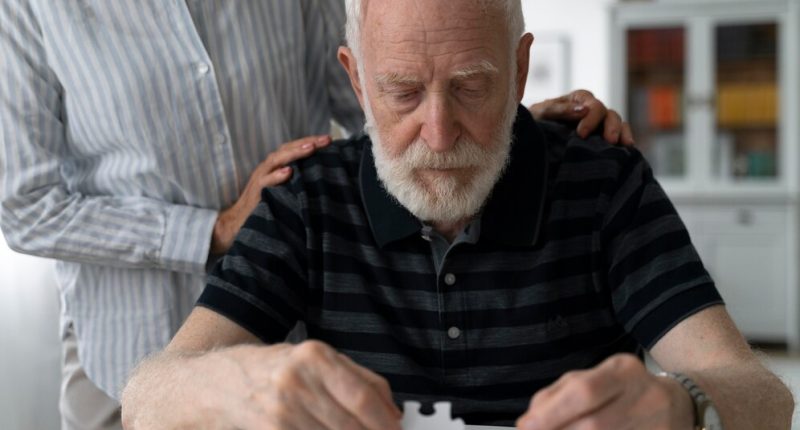Share this @internewscast.com
Reduce the risk of Dementia every day, a condition affecting millions globally, often perceived as an unavoidable aspect of getting older. However, recent groundbreaking research has unveiled that keeping physically active in daily routines could significantly lower the likelihood of developing dementia. This discovery provides a beacon of hope for those aiming to sustain cognitive well-being in their advanced years.

Here’s What the Study Found, According to Dr. Maddison Mellow
Dr. Maddison Mellow, a postdoctoral researcher focusing on the interplay between lifestyle choices and brain health, underscores the considerable influence exercise has on mental sharpness. In accordance with a study posted in Brain Communications, individuals maintaining an active lifestyle throughout their life tend to have a reduced chance of cognitive deterioration, even when displaying early signs of Alzheimer’s disease, such as amyloid accumulation or reduced brain size.
This research assessed information from over 450 individuals born in 1946, monitoring their physical activity habits over three decades. The findings demonstrated that engaging in exercise before hitting 50 was notably advantageous, as it nurtured a larger hippocampus, a brain area critical for memory and learning. Dr. Mellow highlights that these results are in line with wider research indicating that even minimal moderate-to-vigorous physical activities can decrease the risk of dementia by as much as 41%.
Also Read | Men Who Skip PSA Screenings Face a 45% Higher Risk of Dying From Prostate Cancer
A Chance to Reduce Dementia Risk
The implications of these findings are enormous. Dementia is not just a personal health challenge but also a societal one, with significant emotional and financial costs. Encouragingly, the study suggests that even frail older adults can benefit from modest increases in physical activity. For instance, engaging in just 35 minutes of moderate exercise per week was associated with a dramatic reduction in dementia risk.
Moreover, women appear to derive even greater benefits from lifelong physical activity compared to men. This underscores the importance of tailoring public health initiatives to encourage exercise across all demographics and life stages. As Dr. Sarah-Naomi James from UCL notes, staying active is one of the most accessible ways to safeguard brain health.
Practical Changes for Everyday Life
Incorporating exercise into daily routines doesn’t have to be daunting. Here are some actionable steps:
- Start Small: Even five minutes of brisk walking or light stretching per day can make a difference.
- Set Weekly Goals: Aim for at least 150 minutes of moderate-intensity activity per week, as recommended by global health guidelines.
- Mix It Up: Combine aerobic exercises like walking or cycling with strength training to maximize benefits.
- Make It Social: Join group activities such as yoga classes or walking clubs to stay motivated and engaged.
- Track Progress: Use wearable devices or apps to monitor activity levels and set achievable milestones.
For example, an older adult might begin with short walks around their neighborhood and gradually increase duration and intensity over time. Similarly, incorporating fun activities like dancing or gardening can make exercise feel less like a chore and more like an enjoyable part of daily life.
A More Nuanced Approach to Brain Health
While exercise is crucial, it’s only one piece of the puzzle when it comes to reducing dementia risk. A holistic approach that includes proper nutrition, mental stimulation, and stress management is equally important. Studies have shown that balanced diets rich in omega-3 fatty acids, antioxidants, and essential vitamins can enhance cognitive function. Additionally, practices like mindfulness meditation and maintaining strong social connections further support brain health.
For instance, individuals who follow a Mediterranean-style diet—characterized by fruits, vegetables, whole grains, and healthy fats—tend to have better cognitive outcomes than those who consume highly processed foods. Similarly, engaging in mentally stimulating activities such as puzzles or learning new skills can help maintain neural plasticity.
Conclusion
The evidence is clear: regular physical activity is a powerful tool for reducing dementia risk and promoting overall brain health. As Dr. Mellow and other experts highlight, even small changes in daily habits can lead to significant long-term benefits. By combining exercise with other healthy lifestyle practices, individuals can take proactive steps toward preserving their cognitive vitality.
This new research serves as both a wake-up call and an opportunity—a chance for people at every stage of life to invest in their future well-being. Whether through brisk walks in the park or mindful meditation sessions at home, the path to better brain health begins with simple yet consistent actions today.
Also Read | Sit All Day? Do This 1-Minute Exercise to Protect Your Health, Study Finds
We offer the most up-to-date information from top experts, new research, and health agencies, but our content is not meant to be a substitute for professional guidance. When it comes to the medication you’re taking or any other health questions you have, always consult your healthcare provider directly.
















